An Interview with an "Endlessly Fascinating" Richard III
DruidShakespeare's Aaron Monaghan
Channels a Memory and the Real Richard
By Eric Minton
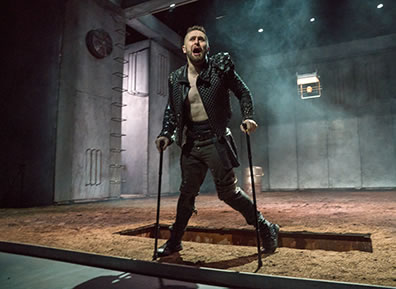
Aaron Monaghan as Richard in the DruidShakespeare production of William Shakespeare's Richard III during the Lincoln Center White Light Festival. The company took up a two-week residency at the John Jay College's Gerald W. Lynch Theater. Photo by Richard Termine, Lincoln Center.
I didn’t specifically remember the name Aaron Monaghan when I saw it tied to the title role of DruidShakespeare’s production of William Shakespeare’s Richard III. I did know about DruidShakespeare. I reviewed the company's epic cycle of Shakespeare's second history tetralogy, The History Plays, when it participated in the 2016 Lincoln Center's White Light Festival in New York. The company presented its production of Samuel Beckett’s Waiting for Godot at last year's festival, but we saw that production at Chicago Shakespeare (Monaghan played Estragon).
DruidShakespeare returned to the White Light Festival this year with Shakespeare's Richard III, and when the festival reached out to me about doing an interview, I agreed—you can never interview too many Richards, I figured. Only after the meeting was set up did I type “Monaghan” in the Shakespeareances.com search engine. The History Plays came up, but so did a mention in my 2016 year-end wrap-up recalling how I had been “enthralled with Marty Rea's Richard II, Rory Nolan's Falstaff, Karen McCartney's Boy, and anything and everything Aaron Monaghan does (especially Pistol, but also Mowbray, Worcester, Exton, Dauphin, and Chorus).”
So that's Aaron Monaghan.
One of the visual motifs Druid’s co-Founder and Artistic Director Garry Hynes used when she helmed The History Plays was a graveyard at the back of the stage that expanded during each intermission of the four-play production. Between Richard II and Henry IV, Part One, Monaghan’s Exton spent the intermission digging Richard’s grave. Between Henry IV, Part Two, and Henry V, Monaghan spent the intermission raking up the dirt on the stage and then literally leaped into the part of Chorus. Hynes also helms Richard III, which opens with an empty grave at the front of the stage. Well, not really empty, because, after a moment, Monaghan pops out of it with the gleam-eyed look of a Dick-in-the-Box.
We attended a Sunday matinee performance of Richard III at John Jay College’s Gerald W. Lynch Theater and then headed to a nearby hotel where we met Monaghan in the lobby. As we settled around a table in the hotel’s lounge, I started the interview.
What is it about you and graves?
It’s an interesting thing. The great thing about Druid is that the productions generally evolve. So over the course of DruidShakespeare, I did that Chorus role and the idea of the grave came into it. A theme emerged for us. When we knew we were going to come back and do Richard, Garry and the team go back and look for motifs and themes and things like that, and that translates into the ensemble style we do. We thought it would be interesting with me coming out of the grave. There’s obviously so many graves in DruidShakespeare as well.
We did a couple of different versions of [The History Plays] that were site specific to Druid, which is a very, very small, intimate space. The audiences were in another building across the lane from where Druid is, an old monastery I think. So the room was in this monastery, and we came out and began the piece, and the audience followed us into the room. When they finished the first play, Richard II, when they came out, there were gravestones for all the characters in that play there. Every time they came in and out of the shows, there were more and more gravestones.
Like what you did here, when you put gravestones at the back of the stage.
That’s exactly right. That’s something that evolved over the course of tech and over the course of performance, as well. Garry and the team are great with that: You can have an idea and that can evolve and mutate into something else.
Was it my imagination or was Catesby (one of Richard's henchmen) a transfer from Waiting for Godot?
It’s not a million miles away from it. Marty (Rea), who played Catesby, had this idea that he wanted to have a bowler hat. It’s kind of incongruous with the rest of the design [Designer Francis O'Connor dressed the production in Elizabethan costumes], but it obviously kind of works.
And the droll way he spoke.
Yeah, it’s not a million miles away from it. That comes from the ensemble nature of Druid. It was obviously in the ether, I guess, those ideas. Same with me playing crippled characters [his Pistol couldn't bend his knee]. And there’s a fat suit in there as well, Garrett (Lombard as Hastings) wears the fat suit instead or Rory [Nolan, who plays Buckingham and played Falstaff in The History Plays].
I’ve now seen 22 Richard IIIs, including Antony Sher’s.
Wow!
Yeah, I’m that old. He used the crutches. Did you go back and look at that or was this totally your creation?
The sticks, no. To be honest, I kind of wanted to stay away from them.
Long before I was an actor, when I was a kid, I remember seeing a documentary about the making of that show, which I talk about in interviews, and nobody seems to have seen it. I remember flicking through the channels and coming back to it. And this was a kid who had no interest in it and no idea what they were doing, but I remember that really, really specifically. I watched the entire thing just out of curiosity. When I went to college, my voice coach gave me the dream speech in Act Five, after he wakes up from the dream, to work on. So I figured out what play this was, I put two and two together, and I discovered this was the documentary that I had seen eight years previous, and I kind of became obsessed with this character.
But when it came to doing it, my process is that I do all the research that I can, I do all the work I can, and because of the constantly changing, evolving nature of the room and what the ensemble brings and what the designers bring, I never really make decisions until I get in there. I feel like I want to be able to do whatever is required of me or whatever I can discover. I’d be happy to experiment up until the previews, genuinely. It was in the first week that Garry and David (Bolger, movement and fight choreographer) were feeling a little bit about how is this guy going to move and how is he going to look. So they brought in these sticks. I was very aware that you’re never going to be able to get away from the ghost of Antony Sher. But they liked it, so I just went, OK, I’ll stick with them.
He was a spider. When you came up on Lady Anne, the image that hit me was a Komodo dragon.
Oh, there you go. Interesting. There’s a lot of animal images in the play, and I like, when I’m warming up, to do a lot of animal walks and flows and stuff. Very early on in rehearsal I was playing around with this idea of a gorilla, the way he puts his hands [he demonstrates with his knuckles on the table].
The way you get up to your feet.
Yes, that type of thing. So those arms became extended, I suppose, in Garry's and David’s heads. I think it’s quite dog like a lot of the time, too: there’s a cocked leg there and it’s something houndlike. Richard’s called so many different animals in the play—toad, hog, boar, all those things—and there’s so many references to birds, as well. I find it endlessly fascinating.
Some of the best Richards I’ve seen were those who played the Henry VI Richard, who played him in the prequels. They have Shakespeare’s backstory for the character.
Right, OK; interesting.
Did you do much studying back to those plays or did you try to keep this as just its own play?
I did, personally. I got to know those plays as much as I could. I’m hoping at some point we get to do all eight of them. I mean, they’re just there, ready to go.
You only have to do three more.
I know, exactly, right? I think we made a decision that we would concentrate on the version that we were doing, which is obviously a very edited version as well.
Good edit, though.
It’s not a bad edit, yeah, and Garry was great to let me have a hand in a lot of that, as well. There was stuff that was cut very early on, like the Duchess being cut, and I was, no, I think that’s absolutely necessary that she’s there.
As an actor you’re only dealing with what you have. So, for example, in Act III, Scene 7, where Buckingham is saying, “Stand between two churchmen”: In the previous scene, Richard has already decided that. He says to Catesby and Ratcliff, “Go thou to Friar Penker; go thou to Doctor Shaw. Bid them both meet me within this hour at Baynard's Castle.” So Richard has already made that plan. That’s interesting within the actual extended text, Richard’s letting Buckingham think he’s created the plan, but already he’s spinning it. But we’ve cut a lot of that out. So you have to play the text that you’re playing. I kind of go, oh, that’s a good idea, let’s do that. You can’t play what isn’t there, even though the temptation is very much there because I think it’s much more Machiavellian and much more thought out in Shakespeare’s better version. It’s always going to be.
You have the advantage with Richard in that you studied that last speech in school.
Yes, before I really understood it.
Coming out of Henry VI Two and Three, with that speech he kind of comes full circle. Reading Sher’s diary, he didn’t read those plays, he just watched the BBC version, and he consulted psychiatrists and things like that, and they determined he had real mommy issues.
I think so, too.
I think he had real daddy issues.
[Laughing] Yeah, right, yeah, yeah, yeah.
Because in the first two parts, the relationship with his dad was so important.
Absolutely.
He specifically cuts off Somerset’s head because that’s his dad’s mortal enemy. But anyway, that last speech, by that time we’re tired, your tired, we’re ready for the next big famous line and the ending, but that speech is so, so key. Talk me through how you approached that speech.
That speech is endlessly, endlessly fascinating. It’s literally a man whose psyche is split.
You played him that way.
Yeah, I think I did today. There’s other times I kind of don’t. It depends on how you arrive at it, really. It starts with this alarming dream thing, and yet it’s still a soliloquy as well. It’s bizarrely least like a soliloquy in parts because he’s talking to himself.
Which is the thing. He starts off the play talking to the audience. But that last soliloquy, his audience is him.
Yes, that’s it.
It’s like he’s divorced himself from the audience.
And there’s the great question of what edit you do, because there’s the “I am I” or “I and I,” and on a given night I can kind of pick and choose. What I find fascinating with that speech—well, there’s two things I feel. The punctuation. Sometimes I throw the punctuation away, if I’m really honest. I’m a stickler for the rules, but sometimes I have to tell myself to break them all. I think they’re there for experimentation for you to discover. When you take the punctuation out of that speech, it’s endlessly fascinating. Take any line, like “O coward conscience, how dost thou afflict me!” So you can kind of go, “O coward—conscience, how dost thou afflict me?” Or, “What do I fear? myself? there's none else by.” You can read that as “What? Do I fear myself? There’s none else by.” Or “What do I fear? Myself. There’s none else by.”
So you approach Shakespeare as jazz.
In that speech I certainly do. Other speeches, no. I feel the rhythm is there, the punctuation is there, the end lines are there, the rhyming is there, it’s very very consciously there for you to play with. Not to be too ornate or overdecorative with, but I find they are the things that push you forward as a performer to keep it very, very alive. I feel like the better you know that score, the easier it is to play jazz. But that one, yeah, it can run away with you.
So, using the jazz allegory, is that how you’re feeling on any given performance?
Yes. Especially by the time you get to that point in the play.
So there’s a different Richard that ends up at the end of the play?
There’s a different Richard every night because there’s just so many aspects to it. It opens with a soliloquy to the audience where he says quite literally in 13 lines, this, this, this, this, and this, but. And he tells them, I am going to be a bad guy, and I’m going to lay out all my plans for you. He tells us pretty much everything and says, come along for the ride. Sometimes, when I’m backstage, I might think of the Henry VI version of him who is feeling a bit useless, a bit discarded, missing the war, missing his purpose; a little bit hateful of himself. Sometimes I need to remind myself to bring the audience in. Literally, when I pop my head up, I don’t really know what way it’s going to come out.
That’s why we get that look from you.
Yeah, absolutely. And it’s a gift as well. It’s a huge, huge, challenge, but it’s a gift, because the audience is different every night. My job is to say, come with me, and sometimes they’re absolutely 100 percent on board, and sometimes they’re not so sure. Then, depending on how you play all those “deformed,” “unfinished,” “sent before my time,” sometimes I hate myself a little bit.
You were bitter today.
Yeah, I probably was.
You were very snide in those first dozen lines and then on “lascivious pleasing of a lute,” that was the demarcation when you went from being snide to really bitter.
Yes. And sometimes I feel that I’m quoting what I’ve heard other people say.
The only thing I tell myself every night is to mean it. Sometimes you mean certain lines more. You don’t always mean every line, but sometimes you discover that your Richard is a bit more bitter or you could do this version of the show where—and it’s a dangerous thing—where you can find him much too easy, where the audience can really enjoy how easy he achieves his goals, and at times we’ve done that. Sometimes I think about it the night before and I feel what did I not do last night, what do I want to achieve, and I might focus on that a little bit more. But I feel like the play and the production should be flexible enough and my performance should be flexible enough to be very live. That’s my philosophy as an actor, to be responding to what the other actors are giving me, to what the audience is giving me, and to what you’re connecting with at a particular moment.
That’s also being part of an ensemble, a jazz ensemble.
Oh, absolutely.
We made a lot of decisions once we got here, some blocking-wise and some in terms of how we play it. [In Galway, the play used a 100-seat theater in an amphitheater format; Gerald W. Lynch Theater is a proscenium arch stage.]
This is what I love, having seen the play 22 times and read it seven or eight, that you still get new things. This is the first time I noticed that he repeats the shadow reference. He says it in the first speech, and then when he’s going to get the tailor, he says it again. I have never noticed that before. You obviously did pick up on that.
Absolutely. And it’s kind of hard not to when those big blue lights are flashing down at you.
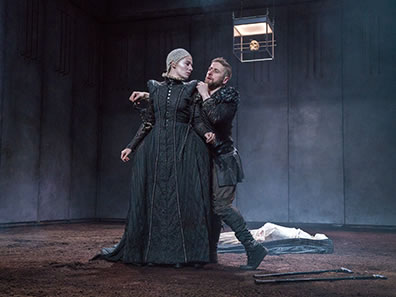
Aaron Monaghan as a crooked-legged Richard wooes Lady Anne (Siobhán Cullen) in the DruidShakespeare production of William Shakespeare's Richard III. The production is part of the Lincoln Center White Lights Festival. Photo by Richard Termine, Lincoln Center.
To a degree that self-loathing that’s under the surface in that opening soliloquy turns on its head after he successfully woos Lady Anne, and you guys play it that he’s very successful wooing Anne.
I have a feeling it’s a speech of discovery, going, can you believe that? He’s always one step ahead of the audience. As soon as they get up to speed, he’s like, but I’m going to do this. He’s always a little bit ahead. But I think that’s a speech of discovery, that he’s going, I can’t believe I just did that. There’s one other—and it’s not a reference to shadow—after the second wooing scene with Queen Elizabeth and she goes off, he says “Relenting fool and shallow, changing woman.” This week I’ve started referring to her as “relenting fool,” and then looking at my shadow and pointing to it saying, “and shallow, changing woman.” I feel that’s a point at which he’s beginning to discover a change in himself, a weakening.
A friend told me that he’s successful until he becomes king and then nothing goes right.
It just collapses. What do you do when you get everything you want? I think tonight we did it a little bit different. I love the small words in Shakespeare, like if. If is so powerful in that play. “Talks thou to me of ifs?” And the word but. First 13 lines and then he says, “But I.” It turns. Same with once he gets crowned. “Thus high, by thy advice and thy assistance, is King Richard seated”—it’s “crowned” in our version. The next word is but (“But shall we wear these honors for a day?”). Tonight, I was playing that I already had decided that it doesn’t matter about being crowned, it matters that we get the kid out of the way. I was a bit forward-thinking in that. Sometimes I go, well now what do we do—but. Does that make sense?
Yes, and but is in this sense a word that’s a window to not being fully satisfied. That was a great meal, but it could have used some steak sauce.
Absolutely, yeah. Completely. It's amazing, the instant he puts the crown on his head, but.
I love the way you guys did that, by the way [the crown sat on a skull in a box just out of Monaghan's reach, so his symbolic comment about Buckingham setting him "Thus high" becomes a stage direction as the duke lifts the king up so he can grab the crown]. That's so bizarre.
Oh, great. Good, good. I love that it's just out of reach.
And the pun on "Thus high." Why not, it's Shakespeare.
Absolutely.
There are so many iconic scenes. You have the opening soliloquy—as Sher says, damn Shakespeare for starting you off with one of his most famous speeches. You’ve got the Lady Anne scene. You’ve got the ending scene with “a horse,” the Tower scene with the strawberries and “Off with his head.” Is there a favorite for you?
No. I think I’m there for all of it. I love the journey of it. It’s such a fast-moving play, it’s kind of breathtaking, and it must be breathtaking to watch sometimes. I know in rehearsals—I can’t really see the wood for the trees anymore, it doesn’t surprise me anymore because I’ve literally read it hundreds of times—but I remember in rehearsals it was fascinating to watch others discover the play, discover how quickly it moved. That was thrilling to me, because it was like, yeah, I think so, too, I’ve been thinking of this for years.
It is such an iconic character. It may be Shakespeare’s most iconic. Hamlet is Hamlet, he’s—well, who is Hamlet?
Yeah.
Richard is Richard, and we know who Richard is, so he probably is the most iconic, he and Iago, and people point out how similar they are.
Yeah.
That obviously didn’t scare you taking it on.
[Pause] No.
You’ve been wanting to play this guy since you were 10 years old or something, at least subconsciously.
Yeah, probably. I felt some sort of connection to him, not just the Shakespearean one but the real one. That’s the most surprising thing. That’s what I meant to say when we were talking about that last speech, and I feel the connection to him in that last speech.
I knew I was going to play this character at some point. It just felt right. Of course, it’s with trepidation the first time you say, “Now is the winter of our discontent.” But I’ve been discovering on this run that the audiences here are so literate. They’re so well-read. They’re up for it and they’re into it and they know all about it, so they’re almost up to speed. So I’ve discovered a quality in this first speech. They know that the first words coming out of my mouth is “Now is the winter of our discontent made glorious summer by this sun of York,” and to me that almost takes the pressure off. You know what I’m going to speak, and here you go. So I can have this sort of, yep, you know this, and you know this, and you know this. But.
No, it’s a joy to play. Marty who plays Catesby, we work with each other a lot, and for about a year he kept on asking me before we rehearsed scenes, what are you going to do with this, what choice are you going to make? We’re just very different actors. We work brilliantly together, I love working with him, he’s an astonishing actor, but we work in very different ways. He’s phenomenal, but we’re at completely opposite ends of the spectrum in many ways, because he would say, what take? What take? And I’m like, I don’t know. I have loads of ideas, but we’ll see when we get into the room whatever is required of me. I feel a kind of freedom in that. I know there’s the pressure of the ghost of Shakespeare past or the ghost of Richards past, it’s hundreds of years of him.
And so many available to see.
Absolutely. But I just want to go out there and have fun with it.
It’s a great gift for the play to open with the lead character saying you’re a part of this and watch. I think they are charmed and drawn in by that.
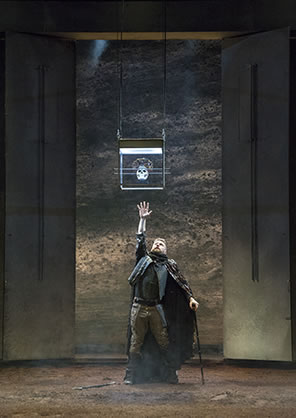
Aaron Monaghan as the newly enthroned Richard III reaches for the crown in the DruidShakespeare production of William Shakespeare's Richard III during the Lincoln Center White Light Festival. Photo by Richard Termine, Lincoln Center.
For me it’s impossible now to watch this play and not think of certain people in the news. Tonight, watching the Londoners scene where religion was such a big selling point, that’s what galls me in real life is how we have a president who is the most impious person but the fundamentalist Christians think is the second coming. For us watching the play, you can’t help thinking certain people. Is that true for you guys playing the play?
Yes and no. I think to push some things so literal on such a great play is death. I think it reduces it down. That’s not to say it’s not there. If you push something on a play and tell the audience what to think, I think you rob them of the act of imagination. I really do. That said, I’m fascinated by this. When we were rehearsing this, the Brexit mess was still happening.
It’s still happening.
Exactly, that’s the endlessly fascinating thing about it.
Now you have your own version in the chair.
Completely. It’s extraordinary. So when we were doing this last year, we were an island between a bigger island and a bigger continent, we looked east and west, and we’re going, what is happening here? This is extraordinary. That usually happens when you’re doing plays, your viewpoint on the world, your antenna are up and you see references to the outside world and, as I rediscovered a bit, that truth is always much more stranger and fascinating than fiction. But to deliberately make it about Trump or about Brexit, I think we would have felt reductive or robbed the audience of the imagination. But what it does do is make you emboldened in your choices, it makes you feel you can’t go too far with this.
Personally, I feel fascinated about being over here. The last thing I want to do is this [he holds his index finger and thumb together in the gesture President Trump uses when he speaks]. The OK sign and the little pursed lips.
Are you ever tempted?
Oh, all the time! I think there probably is some of that body language in there, not intentionally.
Another thing that came up for me today, and this is bothersome to me: before we left this morning, and we live in DC, one of the headlines was that Trump went to the hospital yesterday. It turned out it was an unannounced checkup, but I told my wife, the shame, the sad thing is how much of the country wouldn’t mind something worse. And that comes up in this play. Everybody wants Richard…
Dead. Yeah. Yeah.
Except maybe Catesby.
He’s the steady civil servant, isn’t he?
Exactly.
But it’s funny, what I find really fascinating about this play is that we’re cheering him on because it’s entertainment until he’s not entertainment anymore. In Act Four, he gets so gross and disgusting.
That’s what I feel the challenge is. I feel there’s a further challenge in that if you can charm the audience, if you can get them on your side, you can entertain them and want even more, and then around Act Four to feel I backed the wrong horse here. That’s a great challenge. The further challenge I feel as an actor is thereafter to maybe make them feel sorry for him and to maybe make them feel that he has some sort of human character. And that’s that last speech.
Really good actors create a relationship with the audience, not just of Richard with the audience but the actor with the audience. They're part of your world and you are part of their world. When you come out of that grave, you’ve got us.
Correct me if I’m wrong, but it’s the only Shakespeare play that opens with a direct-address soliloquy to the audience, right?
Yes it is. I hadn’t thought about that.
Right, so I grab that. That’s a gift that Shakespeare…
Oh, Chorus.
In Henry V, yes.
And Rumour (in Henry IV, Part Two).
What?
Rumour.
Oh! Of course, yeah, yeah. But, if you’re talking about a lead character who’s opening the play…
And then there’s Gower (in Pericles).
Oh, don’t make me go there. My point is…
Yes, they are all chorus situations, but as a lead character, I think you’re right.
So to me that’s giving me a big clue that this is part of this man’s makeup. It’s also part of how the play is going to work. You’ve got to embrace it. I find in a lot of my work backstage, in the moments beforehand, it’s not psyching myself up, it’s, like I said, it’s dwelling on saying it as meaning it and making it personal. But it’s not making it personal to Richard so much because the words do that. He tells the audience I’m angry, he tells the audience exactly how he feels about being deformed. You’re always feeling as an actor, you’re never going to be able to emote better than Shakespeare has written it. You just aren’t. He’s given you all the punctuation, all the right consonants, and all the right vowels in all the right places. As an actor, you’re continually discovering that all you’re ever doing is yielding. And you’re just yielding yourself. The more you relax and the more you offer of yourself—you can’t start that speech and put this curtain of character up between you and the audience. You’ve got to go [he spreads out his hands in a release gesture]. It’s a very difficult and brave thing to do, but, my god, it’s satisfying.
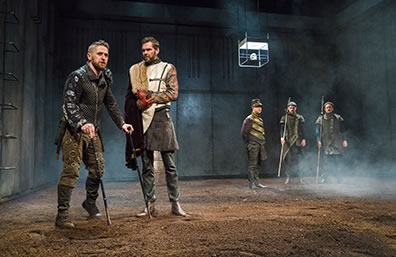
Aaron Monaghan as Richard talks with his brother, Clarence (Marty Rea), heading to prison in the Tower of London in DruidShakespeare's production of William Shakespeare's Richard III, part of the Lincoln Center White Light Festival. In the background are, from left to right, Peter Daly as Brakenbury, Frank Blake, and Rory Nolan. Photo by Richard Termine, Lincoln Center.
I also kind of feel with this play Shakespeare is being subversive. He’s making us like that guy, even though it’s a propaganda play. I’ve been trying to figure this out for years, there’s always a bit of subversion with Shakespeare. I always feel this. And I’ve been trying to figure out where the subversion is, and I think that’s it: he makes us like him. He’s ensured that Richard III will never be forgotten, the real Richard III. Yes, he’s a bastardized version, and the real-life Richard is not even half as remotely interesting as Shakespeare makes him. I’m not all that interested in the real Richard III, I’m really not; I love Shakespeare’s version. But, nearly every night I get to that last speech again, and when I get to the line where I say, “There is no creature loves me, and if I die, no soul shall pity me,” I very, very much think of the real-life Richard III who was underneath a car park until very recently. I feel Shakespeare is being subversive; he’s saying, this was a real guy who ended up strewn across a horse with more wounds inflicted after that.
In Shakespeare’s time they didn’t know where he was.
I was thinking about this tonight when I was lying in the grave at the end, I was going, he’s given us clues that he’s somewhere in Leicester, because they tell us that, near to the town of Leicester. So he obviously had done some sort of research and knew that and was going to guess Leicester.
It’s interesting, maybe I’m just clued in, but when you said that line, I actually thought of the Richard in the car park. I did.
Oh, interesting. Oh great. That’s magic, isn’t it?
It kind of flashed across my mind.
That’s great. Amazing.
Maybe I picked up on what you were doing?
I think thought and intention travels, I genuinely do. I can’t take credit for that. But I feel if you put the thought out there that maybe people read it or something, I really do. I think audiences are incredible, I find human beings are incredible at picking up information instantly. It’s something that comes up as an actor, from how you place your foot to what you do with your little finger, and I think audiences pick up on that stuff. They pick up on nervousness, or they pick up on uncertainty. So better not to be.
Or the fact that your hand got black all of sudden and then you catch the crutch (in the moments leading up to Hasting’s doom in Act III, Scene 4).
I love that scene because that’s a problem, what do you do with the arm? I definitely knew I wasn’t going to not play it with two arms, there’s no way I’d want to do that. We kept coming to the idea that it’s Trumpism, it’s fake news, what happens if you put up a perfectly good hand and say look.
When Buckingham takes you off stage, he’s doing the hand.
Yeah. At one point last year in some of the performances, I got into Hastings' face with my hand outstretched and said, “behold mine arm is like a blasted sapling,” and dared them to say no. And that was really interesting. That was, it’s fake news, that was the reference we made. I love that it’s clean in the next scene.
And the mere fact that you catch the crutch.
I remember saying to Rory, I want you to throw it because as soon as I say, “Off with his head,” it’s done, it’s accomplished. Because this play is about moving forward all the time. At one point last year we had a glove covered in latex. And in the next scene I just peel it off and throw it away. It’s a bit too obvious, so we cut it. But it’s like, what do you do with the hand? It’s one of those mysteries that Shakespeare gives you, isn’t it?
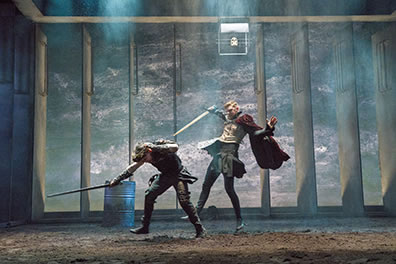
Aaron Monaghan as Richard III fights with Frank Blake's Richmond in the climactic Battle of Bosworth in DruidShakespeare's production of William Shakespeare's Richard III. David Bolger, movement and fight choreographer, worked increasing fatigue into the otherwise standard thrusts, parries, swings, and leaps of stage combat. The production was presented as part of the Lincoln Center White LIghts Festival in New York City. Photo by Richard Termine, Lincoln Center.
Anything else you want to say about this production that we didn’t cover?
No. It’s a joy. Like today again, it’s an exhausting, exhausting play, it’s an exhausting part.
So you and Richmond weren’t acting in the fight scene?
Oh, god no. In that last scene where I’m just telling myself to breath slowly because I know that in five minutes’ time…
You’ll be able to lie down.
Yeah. You have to do a lot of focus on your fitness. We did two of them yesterday and I can’t quite describe the journey of doing that on top of jet lag and on top of a heavy tech schedule last week. But the euphoria that we did two pretty good shows yesterday, and a good show today. For me I kind of feel like to go through that journey is joy. To do it with a really, fabulously fun, full, and well-read audience, what’s not to like? Yes, you’re exhausted, but it’s the highs and lows of being an actor.
I’m living the dream, that’s all I can say.
November 17, 2019



 Find additional Shakespeareances
Find additional Shakespeareances